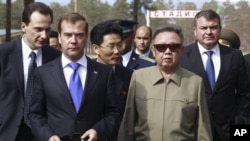The U.S. Defense Department is closely watching events on the Korean Peninsula after the death of North Korean leader Kim Jong Il. U.S. Defense Secretary Leon Panetta has been touch with South Korean military officials in the hours after Kim’s death.
Pentagon officials say the U.S. has not detected unusual military movements by the North Koreans.
U.S. Defense Secretary Leon Panetta is in his home state of California and was on the phone with the South Korean defense minister Monday, as both sides watched events over the border closely.
Pentagon spokesman George Little told reporters the U.S. defense chief and his South Korean counterpart pledged to keep each other informed of events in the coming days.
“Both the secretary and the minister understand that this is a delicate time and they need to closely monitor developments in North Korea and on the peninsula," said Little.
There are reports of a missile test after Kim’s death. Senior defense officials, speaking anonymously, said they believe the missile test was pre-planned and had no connection to the death of the North Korean leader.
Doug Bandow, a senior fellow at the Cato Institute research group in Washington, says Mr. Kim’s death creates much instability and the likelihood of a power struggle.
“It’s very hard to know what North Korean policy will be both politically and militarily during that time period," said Bandow. "Everyone in region is very nervous.”
He said that while there are no reports of unusual movements by the North, U.S. forces have reason to be on alert in the coming days.
“Any kind of instability theoretically could bring the increased prospect of war," he said. "I think that’s very unlikely, but if you’re an American soldier you have to recognize there’s probably going to be heightened security and heightened concern about anything brewing over the border.”
Bruce Klingner is a former member of the U.S. intelligence community who is now a senior fellow at the Heritage Foundation think tank. He says it remains uncertain how Mr. Kim’s successor will behave.
“Perhaps Kim Jong Un may feel even more likely to need provocative behavior to generate a 'rally around the flag' effect or to prove his qualities and his capabilities to any potential challengers," said Klingner. "Given all of those factors, it will remain critical for the U.S. to maintain a vigorous forward deployed military in Japan, including Okinawa, and South Korea to deter and defend and, if necessary, defeat any kind of North Korean attack or other military activities.”
About 30,000 U.S. troops are stationed in South Korea and officials say there are no changes to readiness levels among U.S. forces in the region. The Pentagon on Monday said there is no truth to rumors that the families of U.S. military personnel were leaving South Korea.
Pentagon Closely Monitors North Korea After Kim's Death
- By Luis Ramirez













